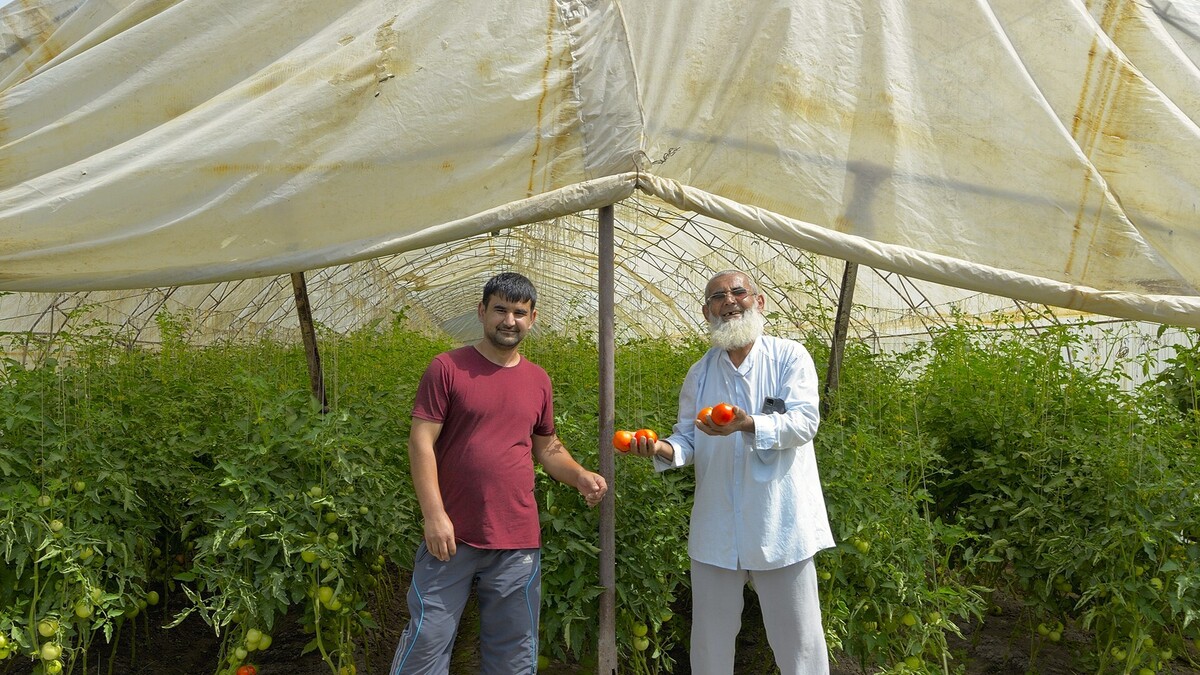Furuz 4
Sobirjon and his son proudly stand before their flourishing tomato greenhouse. Thanks to Furuz's financing, they could purchase better seeds, significantly increasing their yield and income. By investing in Furuz, you create opportunities for 38 small, vulnerable farmers in Tajikistan.

The project
Sobirjon and his son work in a small-scale tomato greenhouse in western Tajikistan. With Furuz's financing, they were able to invest in higher-quality seeds, which greatly improved their crop yield.
Microfinance institution Furuz is primarily active in this region, supporting over 3,500 micro-entrepreneurs like Sobirjon. One-third of their loans go to the agriculture and livestock sectors. For many, Furuz is the first institution where they can access microfinancing.
These loans allow farmers to increase their production, make more revenue, and save money, making them more resilient to droughts, climate changes, pests, and fluctuating market prices. Furuz helps farmers secure their future and escape poverty.
What social return could your investment make?
In Tajikistan, a severe shortage of local jobs forces many to seek work abroad, leading to significant economic and social challenges. Over half of the country’s GDP comes from remittances sent by emigrated Tajiks, who often work in unstable jobs. This highlights the urgent need for sustainable local employment to stabilize and grow the economy.
Microfinance institution Furuz contributes to the solution by supporting small entrepreneurs, mainly farmers. These microloans enable them to create local jobs. Furuz’s efforts demonstrate the powerful role of microfinancing in stimulating economic growth and promoting gender equality in Tajikistan, with approximately 35% of their borrowers being women.
What financial return could your investment generate?
- Annual interest rate of 5,5%
- The maturity of the loan is 24 months
- Grace period: the first repayment of your investment will be made after 12 months. After that, there will be a repayment every 6 months
- With an investment of 1,000 euros, your expected repayment would be 1,083 euros
The story of Furuz
Furuz, founded in 1999, is committed to Tajikistan's sustainable development, focusing on small businesses, financial inclusion, and gender equality. Having issued over 48,000 loans totaling $43 million USD, Furuz has significantly contributed to job creation and economic growth in the region, with an aim to expand and diversify its client base continually.
Furuz in numbers
- Founded in 1999
- Furuz employs 120 staff members across its 8 branches
- 6,000 active borrowers
- 65% of the borrowers are male, and 35% are female
- Issued over 48,000 loans totaling $43 million USD
Furuz
Impact
In Tajikistan, a severe shortage of local jobs forces many to seek work abroad, leading to significant economic and social challenges. Over half of the country’s GDP comes from remittances sent by emigrated Tajiks, who often work in unstable jobs. This highlights the urgent need for sustainable local employment to stabilize and grow the economy.
Microfinance institution Furuz contributes to the solution by supporting small entrepreneurs, mainly farmers. These microloans enable them to create local jobs. Furuz’s efforts demonstrate the powerful role of microfinancing in stimulating economic growth and promoting gender equality in Tajikistan, with approximately 35% of their borrowers being women.
SDGs
With this project, you are contributing to the Sustainable Development Goals below. Read more about the impact you can make through our platform and the SDGs on our impact page.
- SDG 1 No Poverty
- SDG 5 Gender Equality
- SDG 8 Decent Work and Economic Growth
Related blogposts
- Read more about Furuz in their introduction blogpost.
Discover more - Log in or create an account
To protect our partners, certain information is only available when you are logged in. Log in, or create a free account if you are new to Lendahand!